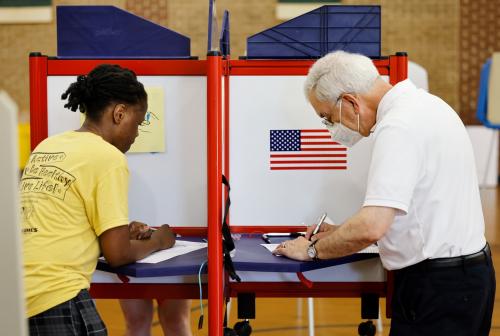When President Barack Obama meets Israeli Prime Minister Benjamin Netanyahu in Washington next week, Iran’s nuclear program is likely to top their agenda. With increasing signals that Israel may be contemplating a strike against Iran’s nuclear facilities, the United States and its European allies have made no secret of their opposition.
In the face of this mounting public disapproval, Israeli Foreign Minister Avigdor Lieberman declared that the issue is no one else’s business and that the allies’ opposition won’t influence Israel’s decision. But how do the Israeli people feel?
They don’t support a strike without U.S. backing, a new poll shows, even though they are not fearful of Washington’s retribution if they go against U.S. advice. They appear less influenced by the rhetoric of U.S. politicians competing for their embrace, and contrary to conventional wisdom, the Obama administration’s reluctance to support a military strike against Iran has apparently not affected their preference for Obama as the next president. In fact, their views seem to partly reflect the White House’s assessment of the consequences of war and the problems created by military action.
Only 19 percent of Israelis polled expressed support for an attack without U.S. backing, according to a poll I conducted — fielded by Israel’s Dahaf Institute Feb. 22-26 — while 42 percent endorsed a strike only if there is at least U.S. support, and 32 percent opposed an attack regardless.
This does not appear to be because of Israeli worries about potential American punishment. In fact, Israelis remain confident the U.S. would support them, at least diplomatically (38 percent), or join the war on Israel’s behalf (27 percent) — even if Israel struck Iran without Washington’s approval. Only 15 percent expect reduced American support. What seems behind these attitudes is an assessment of the consequences of an Israeli attack.
A majority of Israelis polled, roughly 51 percent, said the war would last months (29 percent) or years (22 percent), while only 18 percent said it would last days. About as many Israelis, 44 percent, think that an Israeli strike would actually strengthen Iran’s government as think it would weaken it (45 percent).
Two-thirds of Israelis, meanwhile, believe Hezbollah would most likely join Iran in retaliation against Israel — even if Israel did not strike Hezbollah forces. An additional 27 percent believe Hezbollah would join only if attacked.
What would be the outcome for Iran’s nuclear program? Only 22 percent of Israelis said a strike would delay Iran’s capabilities by more than five years, while an additional 31 percent said it would delay its capabilities by one to five years, 18 percent said it would not make a difference and 11 percent said it would actually accelerate Iran’s capabilities. In a similar poll I conducted (also with Dahaf) last November, 90 percent of Israelis expressed the view that Iran will eventually acquire nuclear weapons.
Since the Israeli public appears not fearful of losing U.S. backing if Israel strikes without a green light from Washington, these results are probably related to the lack of confidence in the Israeli government’s own assessment of the consequences of an attack. If U.S. and European allies have a different estimate of the likely results of a strike, the Israeli public, in turn, has less confidence in its own government’s evaluation.
Reinforcing this interpretation are Israeli public attitudes toward the Obama administration. In the current U.S. campaign rhetoric, Obama is often portrayed as less supportive of Israel — even its detractor. Shortly before this poll was fielded, one story in the Israeli press cited Republican presidential candidate Rick Santorum saying that Obama “was throwing Israel under the bus” and “helping Iran obtain nuclear weapons.”
Not surprisingly, what Obama and the Republican candidates are saying about Israel and Iran is often a lead story in Israel. It is, of course, hard to assess the direct impact of these stories on Israeli public preferences about U.S. politics. No country matters more for Israel than the U.S. — and no country gets more scrutiny in the Israeli press. So whom do Israelis want to see as the next U.S. president?
In our recent poll, Israelis were asked whom they preferred in a paired competition between Obama and each remaining GOP candidate. Not surprisingly, a significant minority of Israelis expressed no opinion or chose none of the candidates. Though the results were sometimes close — within the margin of error — Obama was the preferred candidate over every potential Republican rival among Jewish-Israelis, and ahead of all among a combined sample of Arab- and Jewish-Israelis, except for tying Mitt Romney.
Overall, Obama led Santorum 33 percent to 18 percent; former House Speaker Newt Gingrich 32 percent to 25 percent; Ron Paul 32 percent to 21 percent; and tied Romney at 29 percent. It is noteworthy, that Paul performed slightly better — but within the margin of error — than Santorum, despite his strong opposition to a U.S. role in a military strike against Iran.
What does all this add up to? Contrary to the current discourse in our presidential elections, the Israeli public is neither enthusiastic about the prospect of war with Iran nor swayed by the seeming embrace of Israel by our GOP presidential candidates.
It has to live with the consequences of war and appear to take the U.S. assessment of these consequences seriously in forming its opinions.
With all the white noise surrounding the Iranian nuclear issue, the best service the Obama administration can provide — certainly to American interests and the cause of peace but also to Israelis — is to be faithful to the facts and the professional analysis of what’s at stake if Israel strikes Iran.
Israeli leaders may decide to strike without U.S. support, but their public wants them to follow Washington’s lead — and Israelis appear to be influenced by America’s judgment.



Commentary
Op-edDo Israelis Support a Strike on Iran?
February 29, 2012